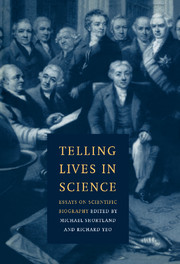Book contents
- Frontmatter
- Contents
- List of contributors
- Preface
- Introduction
- 1 Existential projects and existential choice in science: science biography as an edifying genre
- 2 Life-paths: autobiography, science and the French Revolution
- 3 From science to wisdom: Humphry Davy's life
- 4 Robert Boyle and the dilemma of biography in the age of the Scientific Revolution
- 5 Alphabetical lives: scientific biography in historical dictionaries and encyclopaedias
- 6 The scientist as hero: public images of Michael Faraday
- 7 ‘Tactful organising and executive power’: biographies of Florence Nightingale for girls
- 8 Taking histories, medical lives: Thomas Beddoes and biography
- 9 The scientist as patron and patriotic symbol: the changing reputation of Sir Joseph Banks
- 10 Metabiographical reflections on Charles Darwin
- Index
2 - Life-paths: autobiography, science and the French Revolution
Published online by Cambridge University Press: 28 October 2009
- Frontmatter
- Contents
- List of contributors
- Preface
- Introduction
- 1 Existential projects and existential choice in science: science biography as an edifying genre
- 2 Life-paths: autobiography, science and the French Revolution
- 3 From science to wisdom: Humphry Davy's life
- 4 Robert Boyle and the dilemma of biography in the age of the Scientific Revolution
- 5 Alphabetical lives: scientific biography in historical dictionaries and encyclopaedias
- 6 The scientist as hero: public images of Michael Faraday
- 7 ‘Tactful organising and executive power’: biographies of Florence Nightingale for girls
- 8 Taking histories, medical lives: Thomas Beddoes and biography
- 9 The scientist as patron and patriotic symbol: the changing reputation of Sir Joseph Banks
- 10 Metabiographical reflections on Charles Darwin
- Index
Summary
Introduction
François-René de Chateaubriand, the great French romantic, spoke for an entire generation when in his autobiography he described the French Revolution as a ‘river of blood which separates for ever the old world in which you were born from the new world on whose frontiers you will die’. This sense of the French Revolution as a dark and threatening chasm in time, so different from the joyful novus ordo saeculorum of the triumphant New World revolution of 1776, was undoubtedly one of the major reasons for the outpouring of autobiography which is characteristic of that era. This was so not only because autobiography seemed the ideal vehicle, in many cases, to vindicate the actions of the troubled revolutionary era, but also because autobiography became a way of asserting the continuities of existence and identity across the rupture between the pre- and post-revolutionary worlds. Because of this, it is difficult, and misleading, to see the autobiographies of this time as ‘private’ documents: rather, they are involved with the reshaping of the meaning of the revolutionary era, precisely because they are the medium through which many in France worked through the specific nature of their investment in, and exploration of, the ‘new world’ of postrevolutionary time.
Possibly nowhere did autobiography fill this need more urgently than in the case of the scientific élite.
- Type
- Chapter
- Information
- Telling Lives in ScienceEssays on Scientific Biography, pp. 85 - 102Publisher: Cambridge University PressPrint publication year: 1996
- 3
- Cited by

